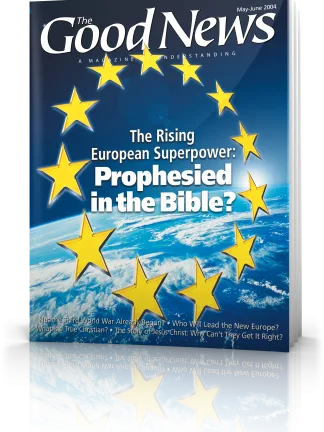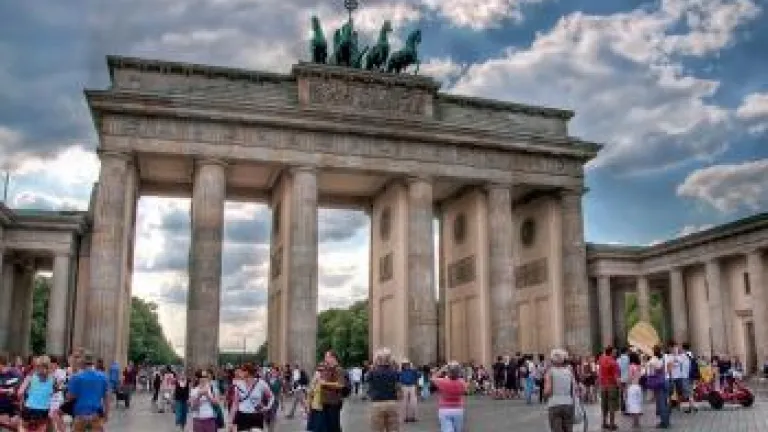Who Will Lead the New Europe?
Few qualities in human affairs are more important than competent, capable leadership. With the May 1 addition of 10 nations joining the European Union, which nation or nations will exercise the most control, for good or bad? Who will govern Europe at the close of this age of man?
During key periods of the 20th century, ruthless dictators like Hitler and Mussolini dominated substantial regions of Europe. Twice in that troubled century, world wars were centered on European soil, bathing it in blood.
The political, geographical and even religious spin-offs still have their deep effects on the nations of Europe. At least in part, the creation of the European Union (EU) itself has its roots in the deepest desire to prevent German control from ever surfacing on the Continent again.
Yet the implications of troubling newspaper headlines like "The Frontier Moves East, With Germany at Europe's Center " send a message to other European nations (International Herald Tribune, March 2, emphasis added).
Vying for EU leadership
Julia Harvey-Brewer, political editor of London's Sunday Express , minced no words in boldly expressing the paper's editorial point of view. "Now is the time for Britain to muscle in and seize control. The arrival of 10 new member states on May 1 will see the EU grow to a vast empire. Yet their arrival offers Britain a unique opportunity to rip down the existing EU structure and to rebuild it in our own image, and more importantly, in our own national interest" (Feb. 22).
Recently British Prime Minister Tony Blair, French President Jacques Chirac and German Chancellor Gerhard Schroeder met in Berlin for very controversial trilateral talks. Despite some French objections, most observers concluded that the United Kingdom had at last entered the coveted European leadership circle.
This is no small achievement. As veteran British journalist Ambrose Evans-Pritchard put it: "For the past 40 years the Franco-German motor has driven European integration, shaping every policy from farming and fishing to monetary union ... Yesterday was the moment when the Franco-German duo—rocked by doubts and presiding over two of Europe's most sickly economies—accepted that they are too weak to keep control of an EU preparing to expand to 25 countries without Britain's clout.
"For Tony Blair it was evidence that Britain can play in Europe's top league and perhaps regain its historic role as a balancing power" (The Daily Telegraph, Feb. 19). The media language used to describe this major shift in the European power equation has been stark to the point of rudeness. "Blair butts in on old Europe," said The Telegraph .
The Polish factor
However, the political editor of The Sunday Express considers that "the new [Eastern European] states are our allies against France and Germany." She means if Britain plays its cards right, it can reshape the European Union and rid it of its federalist and superstate ambitions.
After all, Poland, only a budding new state, has already played a major role in delaying the adoption of a new European constitution, if only temporarily. The plucky Poles have displayed every intention of demanding a significant leadership role in the new Europe. Warsaw is by far the most vocal of the eight Eastern European nations joining the EU, already showing signs of becoming their spokesman. Poland is the largest of the new member states, both in area and population.
Yet as Britain's noted Times columnist (and its former editor) William Rees-Mogg observed: "We cannot leave it to Poland to rescue us twice from this Euro monster" (Dec. 15, 2003). He was also thinking of the historic Polish role in helping motivate Britain to finally declare war against Hitler in 1939. But mostly he was writing in reference to the temporary demise of the European draft constitution, which, had it been adopted, "would have destroyed the democracy of Europe."
The stark language Mr. Rees-Mogg used clearly shows his concern about the general direction of the European Union. He titled his Times article "Dracula Is in His Coffin, but We're Still Not Safe." He is a realist, aptly concluding his analysis with the declaration: "Bureaucrats never give up; we need a reliable stake to put through Dracula's heart ... Next time we cannot leave it to the Poles."
What's behind Mr. Rees-Mogg's concern? Perhaps he remembers better than most how two world wars in the last century came perilously close to extinguishing freedom and democracy throughout Europe.
Leadership and the politics of enlargement
Much has been written in the British press about the politics of enlargement of the European Union. Clearly Russia is nervous about having several of the former Soviet Union's satellite nations—especially the Baltic states of Estonia, Latvia and Lithuania —join the European Union. Russia sees them as potential purveyors of German expansion and influence.
The Eastern European nations seek a power shift. Note the following Time magazine report on the World Economic Forum at Davos, Switzerland: "Amid a mood of cautious optimism and transatlantic cooperation, many sessions were marked by small signs of tension over the question of who is driving Europe. At one lunch, the leader of an EU member-state-to-be bristled when a panelist referred to Britain, France and Germany as the leaders of European policy" (Feb. 2, emphasis added).
Clearly certain smaller states, mostly but not all in the East, want Germany and France to share power as the European Union moves into the future. Even Daniel Gros, director of the Centre for European Policy Studies in Brussels, said, "Germany and France no longer have the moral high ground."
The principal reasons are divisive policies over Iraq and divergent views on state intervention. The Time article concluded with this observation: "If Germany and France want to stay at the head of the pack now, they'll need to turn their idea of a 'core Europe' from a menace back into a motor."
Is a United States of Europe still feasible?
As the European Union's borders move eastwards, is it now impossible to conceive of a federal, superstate Europe? Some statesmen like Václav Havel, former president of the Czech Republic (a leader who spent time in prison because of his courageous opposition to Russian communist domination of his country), are thinking in that direction.
He wrote: "All earlier expansions brought about a shift in the EU, but the current one will have a far more fundamental impact, both on the way the union works and on its policy priorities. Expansion eastwards amounts to a final break with the founding fathers' vision of a homogeneous 'United States of Europe'" (The World in 2004, published by The Economist , p. 44).
Set against this view are the so-called core countries of France and Germany. Stephen Castle reported from Brussels for The Independent: "A multi-speed Europe with France and Germany at its core appeared possible last night, as Paris and Berlin vowed to press for closer integration despite the collapse of talks on the European Constitution. A group of 'core' countries is ready to sign a declaration supporting the constitutional text drawn by the former French President, Valéry Giscard d'Estaing, which failed to win approval at the acrimonious Brussels summit.
"Four of the EU's six founder members—France, Germany, Belgium and Luxembourg —have lined up behind the declaration and efforts are under way to bring the other two founders, Italy and the Netherlands, on board" (Dec. 18, 2003).
Although adding 10 new members to the union will inevitably slow down the drive for a federal superstate, an understanding of both history and biblical prophecy tells us that it will eventually happen. Revelation 17:12-13 reveals that 10 kings or leaders will receive power, and give that power (for a short time) to an end-time leader called "the beast." How many nations will be involved is yet to be seen.
The weight of European history
Not so long ago U.S. President George W. Bush invited Romano Prodi, president of the European Commission, to the White House for lunch. Mr. Prodi pointed out to Mr. Bush that in 2004 "the EU would have 450 million citizens and its territory would stretch from the Atlantic to the borders of Russia" (The Economist, Jan. 3).
"Sounds like the Roman Empire, Romano," came the quick rejoinder. The American president obviously grasps a serious point.
The Economist feature article continued: "The drive for 'European Unity' which will proceed further this year when the EU's membership expands to 25 countries, has deep historical origins. Indeed they do stretch back to the dissolution of the Roman Empire" (emphasis added).
Interestingly enough, in A.D. 800, several centuries after the decline and fall of the original Roman Empire, Pope Leo III crowned Charlemagne in Rome as emperor. His political empire stretched across the map from the Pyrenees Mountains (separating France and Spain) to the Danube River—and from Hamburg in the north to Sicily in the south of Europe.
Translated from the Latin into English, Charlemagne's imperial seal read: "The Renewal of the Roman Empire."
Much later Hitler spoke of a 1,000-year reich with Germany at the helm of Europe. In 1933 his contemporary, Italian dictator Benito Mussolini, predicted that "Europe may once again grasp the helm of world civilization if it can develop a modicum of political unity." The dream of a united Holy Roman Empire has gripped many European leaders, both good and bad, throughout the centuries.
Remember that the Bible is the most important and far-reaching book of all. It gives mankind an overall perspective of past events that no history book can. Jesus Christ and His apostles entered the world scene in the heyday of the Roman Empire. Even most of Britain had been invaded and conquered by Roman armies. The biblical books of Daniel and Revelation deal with the Roman Empire and its revivals—both historically and prophetically.
Europe in Bible prophecy
It's doubtful that any of the current crop of leaders of Europe envision the type of leadership that will eventually emerge within the general territory of the old Roman Empire. Certainly when Valéry Giscard D'Estaing, principal author of the as-yet-unaccepted European constitution, urges other leaders to "dream of Europe," he is not thinking of the troubling prophecies in the book of Revelation.
But the Bible speaks frankly of a two-pronged future leadership along both political and religious lines. It uses the stark terms of "beast" and "false prophet" to describe the true nature of two charismatic individuals who will dominate an end-time dictatorial reign—holding much of the populace of the whole world in its grip (Revelation 13; 19:19-20). Bible prophecy indicates that their reign will pale the brutality of the Axis powers of World War II into insignificance.
The magnetic personality of "the beast" will be so powerful that 10 other leaders will voluntarily give their considerable power to this ruthless political dictator for a short time in future history (Revelation 17:12-13). Even the apostle John "marveled" when Christ's angel showed him a preview of this incredible spectacle in vision (verses 6-7).
These end-time events are scheduled to take place just before the second coming of Christ ushers in the glorious reign of God on earth—bringing humankind 1,000 years of peace, plenty and prosperity. Are we not on the threshold of that awesome event?
But in the meantime, you cannot afford to neglect reading the books of Daniel and Revelation. Properly put together, they reveal the future course of events in both Europe and the Middle East, the principal geographic areas where Bible prophecy will be fulfilled. GN




